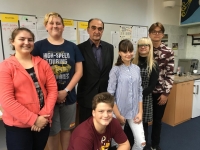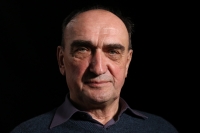If it’s not about life, it’s about nothing
Download image
Stanislav Pohořal was born on October 10, 1947 in Kostelec nad Labem, but grew up in Prague, where he moved with his parents when he was two years old. He had longed to become a soldier since he was a boy, and his dream came true when he was accepted to the Jan Žižka Military School in Trocnov in Bratislava. After graduating, he continued his studies at the Higher Artillery School in Martin, which he graduated from as a lieutenant in July 1968. A month later, Czechoslovakia was occupied by Warsaw Pact troops and Stanislav was transferred to Prague as a platoon leader to protect the embassy buildings of the participating states. A year later, during mass demonstrations against the occupation, the unit under his command guarded the headquarters of the Communist Party. He studied distance learning at the Klement Gottwald Military Political Academy in Bratislava in the 1970s, followed by a relatively steep military career. He first worked as an artillery and missile officer at the unit in Mladá Boleslav and then at the Ministry of Defense as an instructor of the Socialist Youth Union. In his senior command, he also worked for the “special purpose” unit, the so-called radio-electronic combat unit, which had the task of protecting the airspace of the state along the southwestern border, but also to obtain information about a potential enemy. In 1977 he went on a military mission to Libya. At that time, Muammar Gaddafi was the leader there, and Czechoslovakia was supplying weapons and military equipment to Libya on a large scale. In Libya, Stanislav was to cooperate with Czechoslovak military intelligence with diplomatic cover, and according to him, he also had experience as a military counterintelligence correspondent from his previous position. After returning from Libya, he joined the Ministry of Defense as a spokesman. There, he experienced the events connected with November 1989, and as a press spokesman, he attended the then Minister of Defense Miroslav Vacek with representatives of the Civic Forum, led by Václav Havel. The negotiations concerned not only the future of the Czechoslovak People’s Army in a democratic state, but above all the definition of the army’s competencies at the time when the communist regime in Czechoslovakia ended. After the first free elections, Stanislav left the army, resigned from the Communist Party and started a business. First in real estate, later he manufactured and sold glass chandeliers. A little later, he founded a company specializing in investment and business services in the countries of the former Soviet Union. As part of the company’s activities, he became an advisor to the Government of the Republic of Latvia and Lithuania and participated in the creation of crisis management systems in these countries. At the end of his working career, he briefly taught mathematics and physics at one of Prague’s primary schools, and only recently (in 2021) did he decide to leave Prague and spend his rest in the countryside with his wife.


